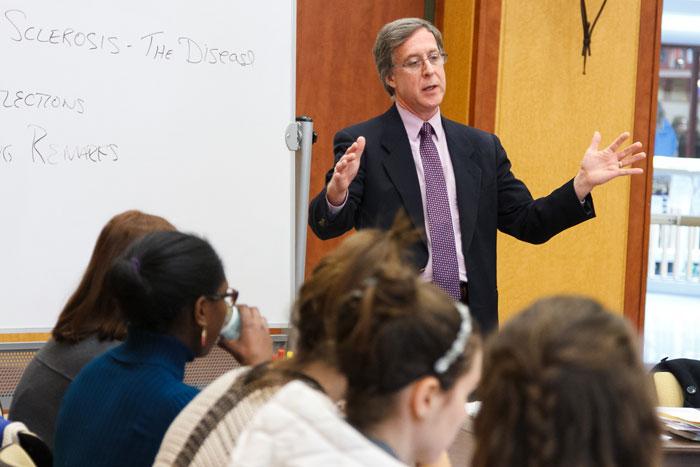What Matters Emerges

During a lunchtime talk, Fred Kauffman '77 spoke of his journey through multiple sclerosis, telling students, "Our lives are not defined by labels, careers, accomplishments; rather, the importance of our lives rests in relationships with those around us, be they family, friends or total strangers." Photo by Carl Socolow '77.
Fred Kauffman ’77 left part of himself behind because of multiple sclerosis, but another part was waiting to be uncovered
by Tony Moore
Fred Kauffman ’77 recalls being awakened at 2 a.m. with an "unbelievably intense sensation" in his right hip. “It was unlike anything I had ever felt," he said. "The pain went from being totally intense and overtaking my leg to being completely gone. And so being a doctor and denying everything, I figured I slept on it wrong and went back to sleep.”
Crossroads
It was 1996, two decades after Kauffman graduated from Dickinson as a biology major, after he had earned an M.D. at the University of Pennsylvania and launched his career as an ER physician, after he had married and had four children. Before that night, his life was going according to plan.
As Kauffman relayed in his lunch talk last spring with pre-health students, that night heralded a derailment of that life plan.
The pain returned every night for two weeks. Finally, Kauffman knew it could no longer be ignored, and he consulted a neurologist, another Dickinson alumnus, Joseph Hulihan ’77. Hulihan put Kauffman through a barrage of tests, and at the end was a diagnosis of multiple sclerosis (MS), an autoimmune disease that essentially makes a person’s body attack itself.
“It’s like taking an electric cord and chopping away at the insulation and then plugging it into the electrical circuit,” explained Kauffman, who was chair of the emergency department at Temple University Hospital. “Things aren’t going to work right.”
Soon, Kauffman’s condition brought him to a crossroads, and he knew he could no longer work.
“I left my profession of emergency medicine,” he said. “And I had a lot of trouble dealing with that and dealing with my disease—a lot of emotional anger, and the family suffered because of it.” Kauffman went through various treatment options and relapses, all the while fighting the disease and fighting for a sense of normalcy. It was a process that developed at a glacial rate, and it’s still ongoing, but along the way, Kauffman and his family turned a long, slow corner.
Confronting the fire and the fear
“Yogi Berra’s wisdom has become clear in my life,” Kauffman said, laying out what was at the heart of his talk with students. “ ‘When you come to a fork in the road, take it.’ The exact road we follow in life is far less important than the growth we experience and the impact we make along the way.”
“I wasn’t sure if I wanted to be here, because to relive this is very difficult,” Kauffman’s wife of 37 years, Wendy ’77, told attendees. “It was a very dark time, but I wanted to say that at this time, 18 years later, we’re in such a better place.”
Over those 18 years, Kauffman has learned to manage his disease, going from years of painful injections to taking a daily pill. He has never again practiced medicine, but his illness doesn’t define who he is. It has evolved—and through his family, so has Kauffman’s role in life.
“As far as who I am, I am most importantly a husband, father and son, and now grandfather,” said Kauffman, who also spoke with students in a health studies course during his visit. “All of that comes well before being an emergency physician.”
While devastating, Kauffman’s diagnosis brought with it an unexpected gift to himself and his family: an inner knowledge that is often discovered by people traveling a difficult path.
“It reminds us of the preciousness of our lives,” Wendy said. “A lot of how wonderful our life is and how special our relationship is, is because we’ve been through the fire and the fear. And I’m sure we’ll have more fear, but the more we deal with this, the more we know. And then we get to come home to who we really are, and that’s what matters.”
Grace Fisher '15 contributed to this story.
Learn more
Published June 16, 2015